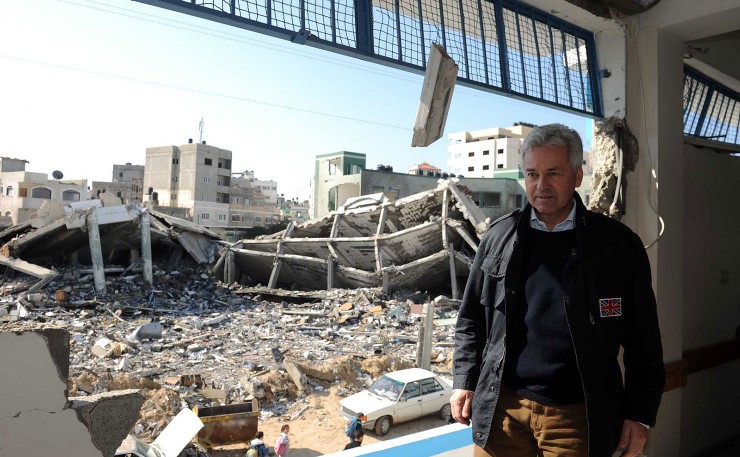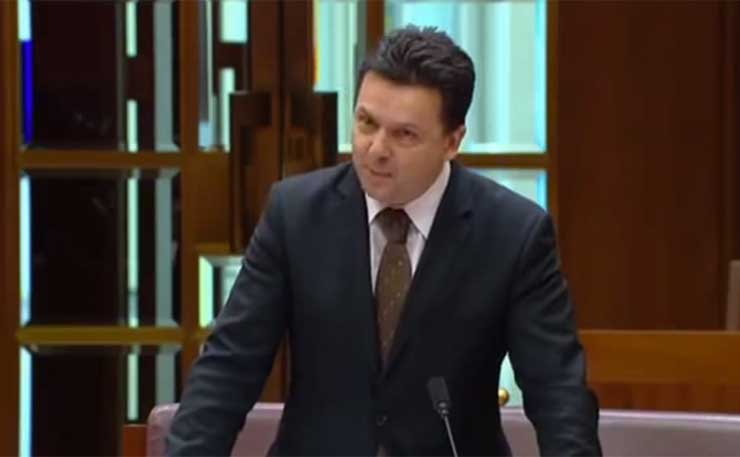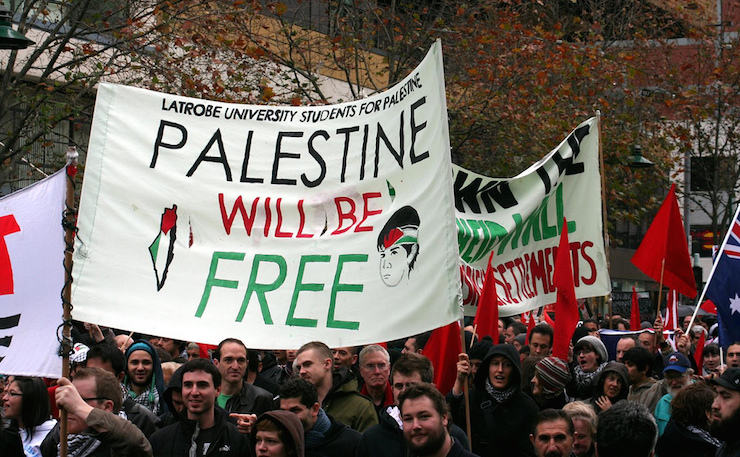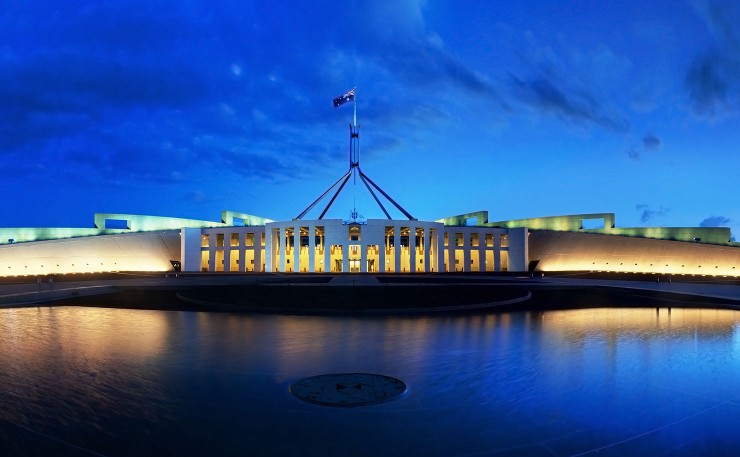In the halls of Australian power, support for one of the world’s most oppressed people remains small, but is growing, writes Michael Brull.
On 28 November, 49 Federal politicians signed a petition urging the end of Israel’s ill-treatment of Palestinian children in the military detention system. The politicians in question are Senators and MPs, primarily from the ALP and the Greens, but also a few from the Nick Xenophon Team, and Andrew Wilkie.
No Coalition MPs or Senators signed the petition.
The petition makes several demands. It calls “for urgent action to end the ill-treatment of Palestinian children in the Israeli military detention system.” It concludes by calling “on the Israeli Government to comply with its obligations under the Convention on the rights of the child and to not arrest or detain Palestinian children unless this is a last resort, and if they are detained, to immediately institute protections for those children including that their safety and best interests are prioritised, and that they are permitted a fair trial.”
In effect, this call is symbolic. A minority of Australian progressive politicians signing a petition is unlikely to force the Israeli government to change long-standing policy. The primary effect, and interest of the petition is in drawing attention to certain issues.
The petition lays out their concerns:
“Israel is the only country in the world that automatically prosecutes children in military courts. And only Palestinian children. Up to 700 Palestinian children are arrested each year by the Israeli military, and this number is increasing. UNICEF reports that ill-treatment of Palestinian children is “widespread, systematic, and institutionalized throughout the process”. Children as young as 11 are detained by the military. According to well documented research, almost all children have no parent or legal counsel during interrogation; 75% report physical violence; a quarter are made to sign documentation in Hebrew, a language they do not understand; 60% are transferred into prisons in Israel meaning family usually cannot visit. Military courts have a 99% conviction rate for Palestinian defendants.”
It doesn’t mention the occupation. It doesn’t mention ill-treatment of adult prisoners. It doesn’t even refer to the West Bank. In effect, it floats without context. It damns Israel for the issue it draws attention to, without identifying the problem as either anomalous or symptomatic.

Over the course of November, nine of the politicians spoke up in Parliament or the Senate. Australian Palestine Advocacy Network – APAN – has a page where they provide links to the speeches, excerpts, and videos of some of them. The speeches were mostly bland and repetitious, as they more or less all referenced the same facts, cited above, and then deplored them. They didn’t propose any action to pressure the Israeli government, nor the Australian one.
How does it reflect the underlying mood of our parliament? Nine of 10 Greens politicians signed it. The odd one out is Senator Scott Ludlam, currently on leave. Three of four politicians from the Nick Xenophon team signed.
Where it gets interesting for me is, if my count is correct, 36 of 49 signatories are ALP Senators and MPs. There are 95 ALP politicians in total from both houses. That is, some 38 percent of federal ALP politicians decided, apropos of no real outcry, crisis, or new political development, to criticise human rights abuses by Israel.
That is the most significant fact of this development.

Now let me note another. Only two years ago, 80 politicians, state and federal, signed a far stronger petition during Israel’s war on Gaza. That petition urged an immediate end to the blockade on Gaza, the occupation, and urged Australia to support a United Nations Human Rights Council investigation into human rights violations in the Occupied Palestinian Territories, including East Jerusalem.
Of the 80 signatories of that petition, I counted 23 who also signed the new one. There were 26 new politicians willing to go out on a limb, representing electorates across Australia, to criticise Israel’s treatment of the Palestinians. Many of them represent areas with relatively few Muslims nor Arabs. They cannot expect any particular electoral gain from their action.
I doubt the 23 ALP representatives expect improved standing in the party from their action.
The fact that this petition, the press conference, and the speeches in Parliament happened at all suggests that there is sympathy for Palestine in the halls of Parliament. The ALP is far more divided on this question than it has appeared for many years.
In February, the State Conference of the NSW ALP threatened to discuss various motions on Israel and Palestine, which would shift the ALP to a position more sympathetic to the Palestinians.
In the end, after various backroom negotiations and manoeuvring, pro-Israel forces won, and the final resolution wound up endorsing propaganda trips paid for by pro-Israel lobby groups. They crowed at their victory. Yet the signs were there: at the grassroots, the ALP and its supporters are not happy at current policy.

As the Jewish News observed, the motions “don’t just originate from Western Sydney branches where Labor politicians are falling over each other for votes; they come from all over the state.”
That is why I was confident that it was merely a tactical defeat which wouldn’t count for much. It is now clear that there are similar sentiments across the country.
The petition is couched in the idiom of human rights and international law. There are other demands that could appeal to the same values. For example, the International Court of Justice in its advisory opinion on the wall in the West Bank held that the settlements and wall are illegal.
Calling for them all to be dismantled would be firmly within the consensus of international law. There is a huge human rights literature on the blockade on Gaza, in my view the most pressing human rights issue in Palestine.
Australia could conceivably shift its policy to oppose the siege on Gaza. Perhaps more ambitiously, Australia could adopt Amnesty International’s policy of imposing a comprehensive arms embargo on the parties to the conflict.
The petition makes clear that those who sympathise with Palestine have a foot in the door. If we can advance a reasonable program, we can build a broad coalition to push for meaningful and substantive change in Australian policy on Palestine.
Below is a list of all Members of Federal Parliament who signed the latest petition.
- Dr Anne Aly MP, Federal Member for Cowan
- Mr Adam Bandt MP, Federal Member for Melbourne
- Hon Linda Burney MP, Federal Member for Barton
- Hon Mark Butler MP, Federal Member for Port Adelaide
- Ms Terri Butler MP, Federal Member for Griffith
- Senator the Hon Doug Cameron, Senator for New South Wales
- Ms Lisa Chesters MP, Federal Member for Bendigo
- Ms Sharon Claydon MP, Federal Member for Newcastle
- Senator Sam Dastyari, Senator for New South Wales
- Senator Richard Di Natale, Senator for Victoria
- Senator Patrick Dodson, Senator for Western Australia
- Mr Steve Georganas MP, Federal Member for Hindmarsh
- Mr Andrew Giles MP, Federal Member for Scullin
- Senator Sarah Hanson-Young, Senator for South Australia
- Mr Ross Hart MP, Federal Member for Bass
- Mr Chris Hayes MP, Federal Member for Fowler
- Mr Julian Hill MP, Federal Member for Bruce
- Mr Stephen Jones MP, Federal Member for Whitlam
- Senator Skye Kakoschke-Moore Senator for South Australia
- Ms Justine Keay MP, Federal Member for Braddon
- Ms Susan Lamb MP, Federal Member for Longman
- Dr Andrew Leigh MP, Federal Member for Fenner
- Senator Sue Lines, Senator for Western Australia
- Senator Gavin Marshall, Senator for Victoria
- Senator Nick McKim, Senator for Tasmania
- Mr Brian Mitchell MP, Federal Member for Lyons
- Senator Claire Moore, Senator for Queensland
- Ms Cathy O’Toole MP, Federal Member for Herbert
- Mr Graham Perrett MP, Federal Member for Moreton
- Senator Louise Pratt, Senator for Western Australia
- Senator Lee Rhiannon, Senator for New South Wales
- Senator Janet Rice, Senator for Victoria
- Ms Michelle Rowland MP, Federal Member Greenway
- Ms Rebekah Sharkie MP, Federal Member for Mayo
- Senator Rachel Siewert, Senator for Western Australia
- Senator Lisa Singh, Senator for Tasmania
- Hon Warren Snowdon MP, Federal Member for Lingiari
- Ms Anne Stanley MP, Federal Member for Werriwa
- Ms Susan Templeman MP, Federal Member for Macquarie
- Hon Matthew Thistlethwaite MP, Federal Member for Smith
- Senator Anne Urquhart, Senator for Tasmania
- Ms Maria Vamvakinou MP, Federal Member for Calwell
- Senator Larissa Waters, Senator for Queensland
- Senator Murray Watt, Senator for Queensland
- Senator Peter Whish-Wilson, Senator for Tasmania
- Mr Andrew Wilkie MP, Federal Member for Denison
- Mr Josh Wilson MP, Federal Member for Fremantle
- Senator Nick Xenophon, Senator for South Australia
- Mr Tony Zappia MP, Federal Member for Makin
Donate To New Matilda
New Matilda is a small, independent media outlet. We survive through reader contributions, and never losing a lawsuit. If you got something from this article, giving something back helps us to continue speaking truth to power. Every little bit counts.






